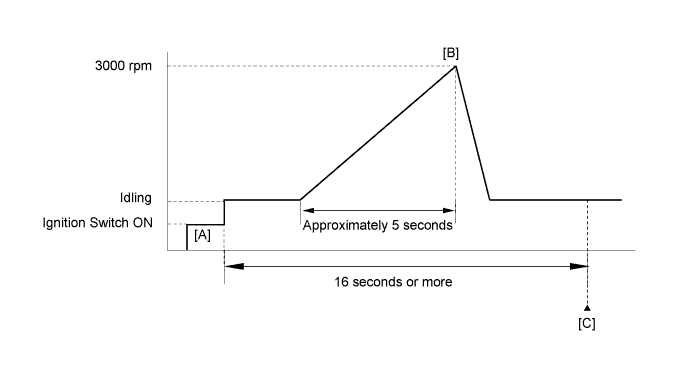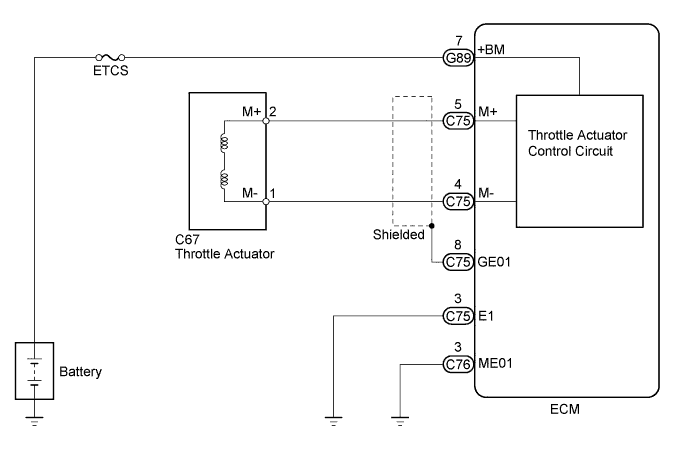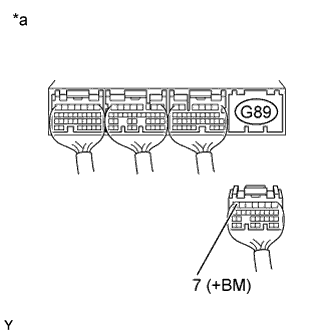Dtc P2118 Throttle Actuator Control Motor Current Range / Performance
DESCRIPTION
MONITOR DESCRIPTION
MONITOR STRATEGY
TYPICAL ENABLING CONDITIONS
TYPICAL MALFUNCTION THRESHOLDS
COMPONENT OPERATING RANGE
CONFIRMATION DRIVING PATTERN
FAIL-SAFE
WIRING DIAGRAM
INSPECTION PROCEDURE
READ VALUE USING INTELLIGENT TESTER (+BM VOLTAGE)
CHECK HARNESS AND CONNECTOR (ECM - BATTERY, BODY GROUND)
DTC P2118 Throttle Actuator Control Motor Current Range / Performance |
DESCRIPTION
The ETCS (Electronic Throttle Control System) has a dedicated power supply circuit. The voltage (+BM) is monitored and when it is low (below 4 V), the ECM determines that there is a malfunction in the ETCS and cuts off the current to the throttle actuator.When the voltage becomes unstable, the ETCS itself becomes unstable. For this reason, when the voltage is low, the current to the throttle actuator is cut. If repairs are made and the system returns to normal, turn the ignition switch off. The ECM then allows current to flow to the throttle actuator so that it can be restarted.- HINT:
- The ETCS does not use a throttle cable.
DTC No.
| DTC Detection Condition
| Trouble Area
|
P2118
| Open in the ETCS power source (+BM) circuit (1 trip detection logic).
| - Open in ETCS power source circuit
- Battery
- Battery terminals
- ETCS fuse
- ECM
|
MONITOR DESCRIPTION
The ECM monitors the battery supply voltage applied to the throttle actuator.When the power supply voltage (+BM) drops below 4 V for 0.8 seconds or more, the ECM interprets this as an open in the power supply circuit (+BM). The ECM illuminates the MIL and stores the DTC.If the malfunction is not repaired successfully, the DTC is stored 5 seconds after the engine is next started.
MONITOR STRATEGY
Required Sensors/Components
| Throttle actuator, Throttle body with motor assembly, ETCS fuse
|
Frequency of Operation
| Continuous
|
TYPICAL ENABLING CONDITIONS
Battery voltage
| 8 V or higher
|
Electronic throttle actuator power
| ON
|
TYPICAL MALFUNCTION THRESHOLDS
Throttle actuator power supply voltage (+BM)
| Below 4 V
|
COMPONENT OPERATING RANGE
Throttle actuator power supply voltage (+BM)
| 11 to 14 V
|
CONFIRMATION DRIVING PATTERN

- Connect the intelligent tester to the DLC3.
- Turn the ignition switch to ON and turn the intelligent tester on.
- Clear the DTCs (even if no DTCs are stored, perform the clear DTC operation).
- Turn the ignition switch off and wait for at least 30 seconds.
- Turn the ignition switch to ON and turn the intelligent tester on [A].
- Start the engine.
- Slowly depress the accelerator pedal, raise the engine speed to approximately 3000 rpm over approximately 5 seconds, and then idle the engine [B].
- Check that 16 seconds or more have elapsed since the engine was started.
- Enter the following menus: Powertrain / Engine and ECT / DTC [C].
- Read the pending DTCs.
- HINT:
- If a pending DTC is output, the system is malfunctioning.
- If a pending DTC is not output, perform the following procedure.
- Enter the following menus: Powertrain / Engine and ECT / Utility / All Readiness.
- Input the DTC: P2118.
- Check the DTC judgment result.
Intelligent Tester Display
| Description
|
NORMAL
| - DTC judgment completed
- System normal
|
ABNORMAL
| - DTC judgment completed
- System abnormal
|
INCOMPLETE
| - DTC judgment not completed
- Perform driving pattern after confirming DTC enabling conditions
|
N/A
| - Unable to perform DTC judgment
- Number of DTCs which do not fulfill DTC preconditions has reached ECU memory limit
|
- HINT:
- If the judgment result shows NORMAL, the system is normal.
- If the judgment result shows ABNORMAL, the system has a malfunction.
- If the judgment result shows INCOMPLETE or N/A, perform steps [B] through [C] again and, if necessary, drive the vehicle for a period of time.
FAIL-SAFE
When this DTC or other DTCs relating to ETCS (Electronic Throttle Control System) malfunctions are stored, the ECM enters fail-safe mode. During fail-safe mode, the ECM cuts the current to the throttle actuator and the throttle valve is returned to a 6.5° throttle angle by the return spring. The ECM then adjusts the engine output by controlling the fuel injection (intermittent fuel-cut) and ignition timing in accordance with the accelerator pedal position to allow the vehicle to continue at a minimal speed. If the accelerator pedal is depressed firmly and gently, the vehicle can be driven slowly.The ECM continues operating in fail-safe mode until a pass condition is detected, and the ignition switch is then turned off.
WIRING DIAGRAM
INSPECTION PROCEDURE
- NOTICE:
- Inspect the fuses of circuits related to this system before performing the following inspection procedure.
- HINT:
- Read freeze frame data using the intelligent tester. Freeze frame data records the engine condition when malfunctions are detected. When troubleshooting, freeze frame data can help determine if the vehicle was moving or stationary, if the engine was warmed up or not, if the air-fuel ratio was lean or rich, and other data from the time the malfunction occurred.
| 1.READ VALUE USING INTELLIGENT TESTER (+BM VOLTAGE) |
Connect the intelligent tester to the DLC3.
Turn the ignition switch to ON.
Turn the intelligent tester on.
Enter the following menus: Powertrain / Engine and ECT / Data List / All Data / +BM Voltage.
Read the value displayed on the intelligent tester.
ResultResult
| Proceed to
|
Below 11 V or higher than 14 V
| A
|
11 to 14 V
| B
|
| 2.CHECK HARNESS AND CONNECTOR (ECM - BATTERY, BODY GROUND) |
Disconnect the ECM connector.
Measure the voltage according to the value(s) in the table below.
- Standard Voltage:
Tester Connection
| Condition
| Specified Condition
|
G89-7 (+BM) - Body ground
| Always
| 11 to 14 V
|
Text in Illustration*a
| Rear view of wire harness connector
(to ECM)
|
Measure the resistance according to the value(s) in the table below.
- Standard Resistance:
Tester Connection
| Condition
| Specified Condition
|
C75-3 (E1) - Body ground
| Always
| Below 1 Ω
|
C76-3 (ME01) - Body ground
| Always
| Below 1 Ω
|
| | REPAIR OR REPLACE HARNESS OR CONNECTOR |
|
|



